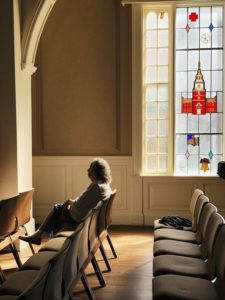Many phrases commonly used to describe the coronavirus pandemic have revolutionary overtones. Covid-19 is the “great disruptor,” the “medical disaster,” and the “economic catastrophe.” Writers assert that Covid-19 “will change the workplace forever,” arguing that its effects are both “global” and “enduring.” Reporting on the wave of unrest sparked by police killings of unarmed African Americans carries similar tones. Reporters describe the scope of the unrest as “unprecedented,” while the level of polarization in the country is “historic.”
COVID-19
10 Questions to Ask Now
We have been reactive. How else can one be during a pandemic? The opinions of outside experts have guided our actions since this all began, and their positions change daily. When to close, how to take church online, protocols to follow before opening. Now, things are slowing down a bit and it is time to become more reflective—tapping into our own wisdom and exploring the potent learning opportunities at hand. The shift begins by asking better questions.
Will There Ever Be a Non-Virtual Meeting Again?

Once the COVID-19 crisis is behind us, I am convinced that more will remain the same than change in congregational life. People have gathered to worship, study, and support each other for centuries in the Christian, Muslim, Jewish, Hindu, and other religious traditions. Congregations have continued their core practices through pandemics, depressions, and wars. After each time of travail, more stayed the same than changed. History tells us to be careful when predicting cosmic change for congregations, even with something as huge as COVID.
Caught Between Anxiety and Anger

Usually when I write these columns, I write as a non-anxious consultant able to offer objective advice in difficult situations. But today I write as a minister fully caught between the two dominant moods of the current debate on re-entry into corporate worship—anxiety and anger.
Agenda Items for Your Board this Summer
Last March as we began to realize the seriousness of the COVID-19 pandemic, congregations entered a creative frenzy. We found ways to offer worship, pastoral care, group fellowship, and education online. Long-range plans went out the window as we rose to short-term challenges.
Governing boards—even those that generally spend time planning and discerning—have understandably become preoccupied with short-term matters. Board members are busy finding groceries, caring for children out of school, and helping out with this or that around the congregation. But “this or that” is not the work of governance. Eventually boards and clergy leaders must return to their core work and formulate a fact-based and compelling vision of the congregation’s future.
When a Congregation Goes Virtual
Congregations around the world have made a dramatic pivot in recent weeks—from regular face-to-face gatherings to entirely online services and meetings via Facebook Live, Zoom, and other platforms. The transformation that decades of proliferating social media and streaming platforms failed to achieve was accomplished by the coronavirus pandemic in just a month.
But what has it been like on the receiving end?
Ministry in the Time of COVID-19

Welcome to the unknown—the one place we are most afraid of.
We all cope with anxiety in our own way—some of us by getting angry, some by withdrawing, and some, apparently, by hoarding toilet paper! Fortunately, some of us, including many of my colleagues in ministry, are coping by moving toward the danger and figuring out new ways to worship and serve in the midst of a pandemic. I am so impressed with the way you imagine new things and learn from each other in these difficult times!




